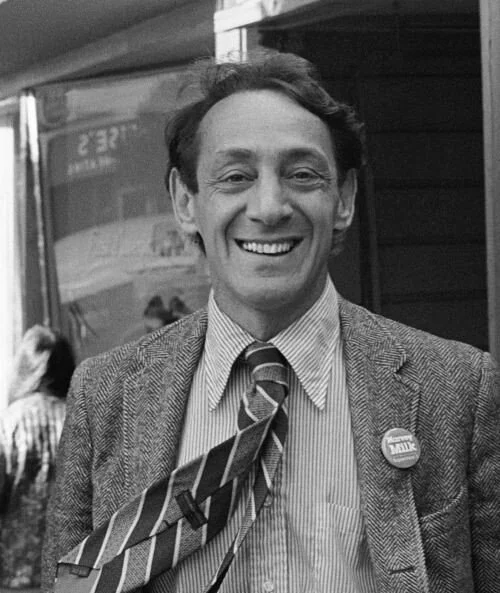"Hope will never be silent" - An Essay on Harvey Milk
Harvey Milk
Lucia Ozaniaková / May 21 2020
(8 min read)
The following is an academic work by one of our IL Ponte Writers and fellow students at BISLA. The presented work will be an exploration of Harvey Milk, the first openly gay elected official of California in history.
The best way to describe Harvey Milk would be as a fighter with unbreakable hope for justice who wanted to establish peace and spread love among all people. His political activism and agenda were focused on creating a beautiful and safe environment for everybody. His concerns were wide ranging, from getting rid of excrement on the streets of San Francisco, to discrimination, profiling, and police brutality. He thought that the local government should take care of its city and communities and was not satisfied with it went about doing it up until that point. Harvey Milk decided to run for the position of state supervisor in 1973 and failed. However, this did not discourage him. He tried three more times, until, in 1977, he was finally elected as the first openly gay official in U.S. history. He was a voice for the voiceless and made the unseen visible. In order to understand his impact, it is important to have a look at Harvey’s background, the historical context of the age he lived, his political achievements, and how he had influenced the gay rights movement even after his death.
Many of his friends said Harvey was at his happiest during his years in San Francisco. Up until his forties, Harvey lived in New York City as a closeted Republican who changed several workplaces from diving officer to teacher to part-time actor to insurance actuary. In 1970, as a 40- year-old man he finally came out and stared dating Scott Smith, who later became his campaign manager. Three years into their relationship, they moved from NYC to San Francisco and opened a camera store, which later became safe haven for gay people. Much like their store to, San Francisco itself was considered quite a safe place for the LGBT community. The reason for this was that, after WWII, San Francisco became home to dozens of gay men expelled from military service. They chose to stay there rather than go back home and face discrimination. In 1969, the Kinsey Institute assumed that San Francisco had more gay people per capita than any other city in America. Even though we cannot say San Francisco was particularly welcoming towards gay people, when we look at it from a larger scope, it was a fairly progressive city by comparison. Formerly, any public display of homosexual activity was illegal up until 1962. They were legalized in all states in 2003. It was also only in 1973 when homosexuality was declared not to be a mental disorder, however it was still viewed as sexual delinquency. Police brutality, discrimination, open hatred, humiliation, and disgust were things that gay people had to deal with on a daily basis. They were publicly called sick and social deviants. In spite of all of this, Milk Harvey announced his candidacy for the position of supervisor as an openly gay man because he wanted to establish peace in the city.
Harvey Milk was a unique politician who ran his candidacy not because of his personal needs, but for all the people that needed to be heard and seen. After he was elected, a reporter asked him if he would be a supervisor for all the people because straights were concerned that gays would take over San Francisco. Harvey responded that he had to be, that is what he was elected for, he would listen to the problems of all people (The Times of Harvey Milk). Harvey talked not only about gays right but also racial discrimination, discrimination of the elderly and the disabled, overseeing and standing up for the rights of all minorities. Even though Milk was politically active only for five year and assumed the office for only ten months, his accomplishments influenced the future. From the beginning, his main goal was to show that being gay is nothing sick or unclean. All people are the same, differences skin colour or their sexual preferences should never be the basis of discrimination. His political campaigns were not only about him but more so about all communities that felt unsafe. More important than win was for him to run for office in itself, since, by being visible, he created a dialogue and brought conversations about homosexuals to the mainstream, which I presume is exactly what he wanted. He gave hope and courage to those who did not have it. After stepping into office, he immediately proposed a bill to outlaw discrimination based on sexuality, as well as one that concerned a massive city clean-up. The biggest challenge he had to face was when conservatives proposed California Proposition 6, which wanted to ban all homosexuals from teaching in schools in the entire state. Their main arguments were that homosexuals influence the sexuality of heterosexuals or that their lifestyle was in violation of God’s law. Regarding that time context, this bill had a hard time passing and, thanks to Harvey’s efforts, it did not manage to pass in the end Though the topic of homosexuality was considered taboo in the public discourse, Harvey Milk brought them to the forefront. Through his moving speeches, he managed to make the masses aware of the plight of the LGBT community and elicit their support in fighting the power structures that oppress and marginalize them. “Gay rights can’t be won from the closet”, he famously said. He urged homosexuals to come out and be proud, to show straight people that even their bosses might be homosexuals but were hiding it because of societal pressure. He publicly doubted the correlation highlighted by the proposition and said that if people were able to influence each other’s sexuality, he would not be a homosexual, given that he was the child of heterosexual parents. His words surprisingly gained support from various prominent politicians, like Ronald Reagan and Jimmy Carter, as well as amassed more and more supporters from both the gay and straight community. Proposition 6 as an openly anti-gay, discriminatory law did not pass. Milk saved the work places and dignity of all homosexual teachers and once again showed society that, at the end of the day, we are all the same.
Undeniably, the importance of Harvey’s legacy became more apparent after his assassination. Milk, together with Mayor Moscone, were killed on the 10th of November 1978 by former supervisor Dan White. Their deaths were a shocking and tragic event which occurred only 10 months after Milk was elected. Six days prior to this event, he had recorded tapes in case he would be assassinated on which he famously said ‘If a bullet should enter my brain, let that bullet destroy every closet door’. After his death, the movement only strengthened and gained more significance. Milk’s former boyfriend, Scott Smith, relentlessly carried on his legacy together with the rest of the LGBT community. In San Francisco, people gathered in the streets and commemorated this tragedy with candlelight march, an act which is repeated every year since then. After six months, Dan White was convicted of a manslaughter but sentenced only for seven years and eight months. This verdict was announced on the 21st of May, the day before Harvey’s birthday. His friend organised a protest. It garnered around 5.000 people but it took a violent turn, as the police started attacking the crowd. The next day, on Milk’s actual birthday, over 20.000 people from San Francisco gathered to celebrate his life and achievements. These marches and riots resulted in mass political changes, as more LGBT people were elected in public office and their presence in police increased. Gay rights activists all around the country were inspired to continue their fight for dignity, civil rights, and freedom of love.
The way Harvey Milk fought for human and civil rights, not only for his community but every other marginalized group, was something really unique. He was trying to show that all disadvantaged groups are human and this earned him love and respect from the public. Even though he did not live long enough to see how much has changed, his legacy is still influential. In 2009, his birthday was formally recognized in California as Harvey Milk Day, and he was posthumously honoured with the Presidential Medal of Freedom by Barack Obama. On the 26th of June, again under Obama’s presidency, same-sex marriage became legal in all states of the US. His story about courage, love and fight for freedom is captured in two movies and I cannot be more satisfied that I had the chance to write about somebody who truly inspired me.
References and Resources
History.com Editors. (2017, June 28). Gay Rights. Retrieved from https://www.history.com/topics/gay-rights/history-of-gay-rights
History.com Editors. (2017, June 7). Harvey Milk. Retrieved from https://www.history.com/topics/gay-rights/harvey-milk
Sant, G. V. (Director). (2008). Milk [Film]. Axon films.
Epstein R. (Director). (1984). The Times of Harvey Milk [Film]. Richard Schmiechen
Rob Epstein.



